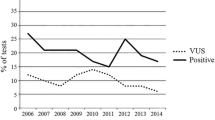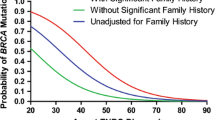Abstract
Women with a family history of breast cancer who are diagnosed with breast cancer are often counseled to undergo prophylactic mastectomy as part of their treatment for breast cancer. The majority of such individuals make these decisions in haste and without appropriate genetic counseling or testing. Most of them when tested for BRCA or other established mutations find that they are not mutation carriers. In retrospect, this realization leads many to question the wisdom of their prophylactic surgery which is often associated with complications and quality of life problems which they never envisioned. We have designed an algorithm for the management of these patients which minimizes these lifelong problems.

Similar content being viewed by others
References
Stolier A, Fuhrman G et al (2004) Initial experience with surgical treatment planning in the newly diagnosed breast cancer patient at high risk for BRCA1 or BRCA2 mutation. Breast J 10:475–480
Ganguly A, Leahy K et al (1997) Genetic testing for breast cancer susceptibility: frequency of BRCA1 and BRCA2 mutations. Genet Test 2:85–90
Lakhani SR, van de Vijver MJ et al (2002) The pathology of familial breast cancer: predictive value of immunohistochemical markers, estrogen receptor, progesterone receptor, HER-2 Neu and p53 in patients with mutations in BRCA1 and BRCA2. J Clin Oncol 20:2310–2318
Foulkes WD, Metcalfe K et al (2003) Disruption of the expected positive correlation between breast tumor size and lymph node status in BRCA1-related breast carcinoma. Cancer 98:1569–1577
Brekelmans CTM, Seynaeve C et al (2001) Effectiveness of breast cancer surveillance in BRCA1/2 gene mutation carriers and women with high familial risk. J Clin Oncol 19:924–930
Scheuer L, Kauf N et al (2002) Outcome of preventive surgery and screening for breast and ovarian cancer in BRCA mutation carriers. J Clin Oncol 20:1260–1268
Schwartz G, Hortogyi GN (2004) Proceedings of the consensus conference on neoadjuvant chemotherapy in carcinoma of breast, April 26–28, 2003, Philadelphia, Pennsylvania. Cancer 100:2512–2532
Wolmark N, Wang J, Mamounas E et al (2001) Preoperative chemotherapy in patients with operable breast cancer: nine-year results from NSABP B-18. J Natl Cancer Inst Monogr 30:96–102
Cady B, Chung M et al (2006) Re: genetic counseling and management of newly diagnosed breast cancer patients at genetic risk for BRCA germline mutations. Breast J 12:282–283
Mammounas EP, Fisher B (2001) Preoperative (neoadjuvant) chemotherapy in patients with breast cancer. Semin Oncol 28:389–399
Tsikitis V, Chung M et al (2004) Scientific basis of neoadjuvant therapy. Semin Breast Dis 7:51–57
Warner E, Trudeau M et al (2003) Sensitivity of BRCA1-related breast cancer to neoadjuvant chemotherapy. Practical implications. Breast J 9:507–508
Pierce LJ, Struderman M et al (2000) Effect of radiotherapy after breast conserving treatment in women with breast cancer and germline BRCA1/2 mutations. J Clin Oncol 18:3360–3369
Hafty B, Harrold E et al (2002) Outcome of conservatively managed early onset breast cancer by BRCA1/2 status. Lancet 359:1471–1477
Komenaka IK, Ditkoff BA et al (2004) The development of interval breast malignancies in patients with BRCA mutations. Cancer 100:2079–2083
Ascherman JA, Hanasono MM et al (2006) Implant reconstruction in breast cancer patients treated with radiation therapy. Plast Reconstr Surg 117:359–365
Narod SA, Offit K (2005) Prevention and management of hereditary breast cancer. J Clin Oncol 23:1656–1663
Hartmann LC, Schaid DJ (1999) Effect of bilateral prophylactic mastectomy in women with a familial history of breast cancer. N Engl J Med 340:77–84
Hartmann LC, Sellers TA et al (2001) Efficacy of bilateral prophylactic mastectomy in BRCA1 and BRCA2 gene mutation carriers. J Natl Cancer Inst 93:1633–1637
Schwartz M (2005) Contralateral prophylactic mastectomy: efficacy, satisfaction, regret. J Clin Oncol 23:7777–7779
Rebbeck TR, Friebel T et al (2004) Bilateral prophylactic mastectomy reduces breast cancer risk in BRCA1 and BRCA2 mutation carriers. The PROSE Study Group. J Clin Oncol 221:1055–1062
Meijers-Heijboer H, van Geel B et al (2001) Breast cancer after prophylactic bilateral mastectomy in women with BRCA1 or BRCA2 mutations. N Engl J Med 345:159–164
Walsh T, Casadei S et al (2006) Spectrum of mutations in BRCA1, BRCA2, chek2, and TP53 in families at high risk of breast cancer. JAMA 295:1379–1387
Eisen A, Rebbeck TR et al (2000) Prophylactic surgery in women with a hereditary predisposition to breast and ovarian cancer. J Clin Oncol 18:1980–1995
Rebbeck TR, Lynch HT et al (2002) Prophylactic oophorectomy in carriers of BRCA1 and BRCA2 mutations. N Engl J Med 346:1616–1621
Watson P, Narod SA et al (2003) Carrier risk status changes resulting form mutation testing in hereditary non-polyposis colorectal cancer and hereditary breast ovarian cancer. J Med Genet 40:591–596
Author information
Authors and Affiliations
Corresponding author
Rights and permissions
About this article
Cite this article
Silva, E. Genetic counseling and clinical management of newly diagnosed breast cancer patients at genetic risk for BRCA germline mutations: perspective of a surgical oncologist. Familial Cancer 7, 91–95 (2008). https://doi.org/10.1007/s10689-007-9167-3
Received:
Accepted:
Published:
Issue Date:
DOI: https://doi.org/10.1007/s10689-007-9167-3




